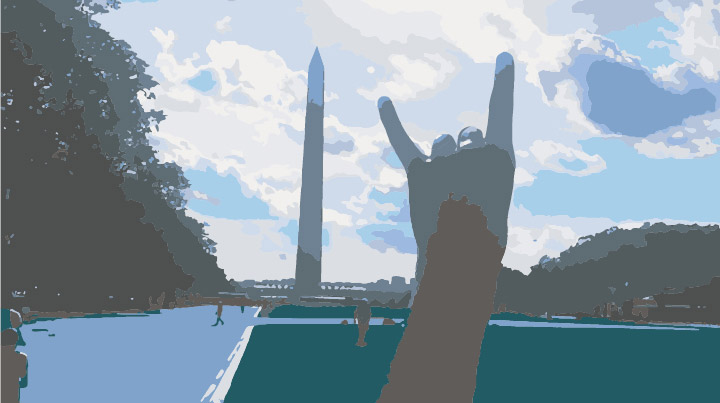CMU builds on recent civic engagement opportunities by launching the CMU civic forum
As a political science and sociology major at Colorado Mesa University, Ta’lor Jackson has learned a lot about the historic underpinnings of democracy and how government works. Jackson has had a chance to converse with a future U.S. Supreme Court justice and a former secretary of state. She has made the rounds in Washington, D.C. and become familiar with the Colorado State Capitol. She has observed judicial deliberations, helped to register voters and organized debates.
In addition to those experiences, there is one college-acquired skill Jackson considers the most important — she has learned how to listen, really listen, with an open mind and a respect for beliefs that might be different from her own.
"Any time there is an opportunity to go to something where different perspectives will be presented, I go,” said the 28-year-old from Vernal, Utah.
Jackson’s experiences serve as a model for the kind of civic engagements CMU wants to make more readily available to more students through the new CMU civic forum.
CMU students have had an abundance of opportunities recently as the university has provided access to unique and remarkable people and events in order to actively promote civics, democratic ideals and civil discourse on campus.
The effort also extends to the broader community. At a time when polarization and partisan nastiness has exploded across the country, and institutions of higher learning are too often denigrated as bastions of liberal elites, CMU is attempting to dispel that notion and provide the community with opportunities where people can practice civic habits and behaviors that enhance the cause of civility in western Colorado and beyond.
Accommodating and promoting diverse opinions on the CMU campus has taken place through serious events such as formal debates and academic speeches. It also has taken on a more colorful countenance through controversial guest speakers and thought-provoking theatre presentations. In all arenas, it has followed a maxim that former Wyoming Senator and noted plain talker Alan Simpson mentioned in a speech on the CMU campus several years ago: “Set the BS aside and look at the facts.”
“CMU is a vital crossroads for ideas in western Colorado,” said Derek Wagner, CMU vice president for intergovernmental and community affairs. “What you’ve seen in recent months is our campus coming together with a very broad range of leaders to provide more and more opportunities for civic engagement and civil discourse. In 2019, we’re excited to build on this success in order to get more people talking to one another.”
CMU is not alone in this endeavor. The drive to promote civility related to civics is part of a nationwide effort. Other colleges are taking steps that include having students from diverse backgrounds live together or sit down together for occasional dinners. Some universities are doing studies on how to handle incendiary speakers and are training some students to run campus-wide discussions on important social issues.
The Association of American Colleges and Universities has been stressing the importance of these efforts since the organization conducted a study in 2012 and produced a report for the U.S. Department of Education. It called for making civil discourse an educational priority. It put the onus on higher education institutions to assure that students leave college with the skills and knowledge needed to be informed, civically-engaged citizens.
The report cited the danger of not taking this on as a higher education mission — noting the current breakdown in public discourse, and having an uninformed public, as having the potential to eat away at the core of democracy.
The national Center for Civic Education, a nonprofit that advocates for increased civics learning in the country, is pushing the idea that civil discourse is not possible without a knowledge of civics. CMU plans to take the historical angle within the initiative. Without knowing about the basis for government structure and laws, the center warns, it is difficult to sift out false claims from elected officials, to turn around low voter turnout, to avoid getting caught in hateful vitriol and to understand what is and isn’t fake news.
“Learning the history of civics and exploring where civility comes from has never been more important,” said CMU President Tim Foster, a former state legislator who served when bipartisan cooperation was the norm. “But it is striking how unsuccessful society has been at overcoming the loss of civic awareness and civility. To move forward, part of our initiative will be to look into the past at how American democracy was formed and how our basic freedoms are sustained.”
In the interest of ramping-up civic engagements for students, CMU’s efforts in the recent past have included:
- The nationally-broadcast gubernatorial debate between Democrat Jared Polis and Republican Walker Stapleton. The two answered questions submitted from public television viewers around Colorado on topics that included economic development, education, transportation and immigration. Students produced the live broadcast with Rocky Mountain PBS, which later aired on C-SPAN.
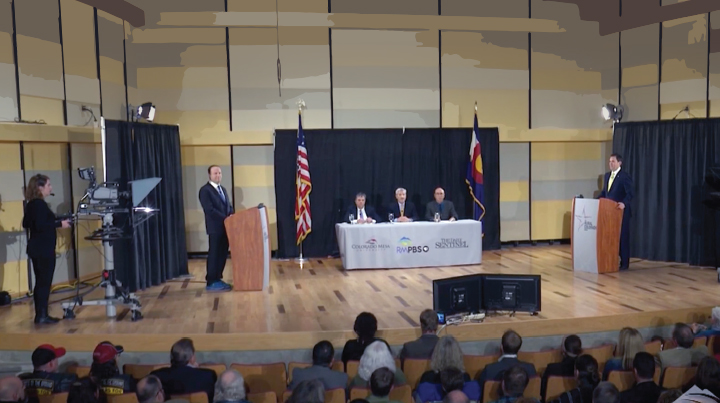
- An on-campus special session of the U.S. Court of Appeals for the Tenth Circuit was open to students and community members. The justices heard five different appeals in what was an eye-opener for observers. It was also a historic occasion as it was the first time the Court heard oral arguments in western Colorado. Students had a chance to ask the justices questions following the hearing in a Q&A.
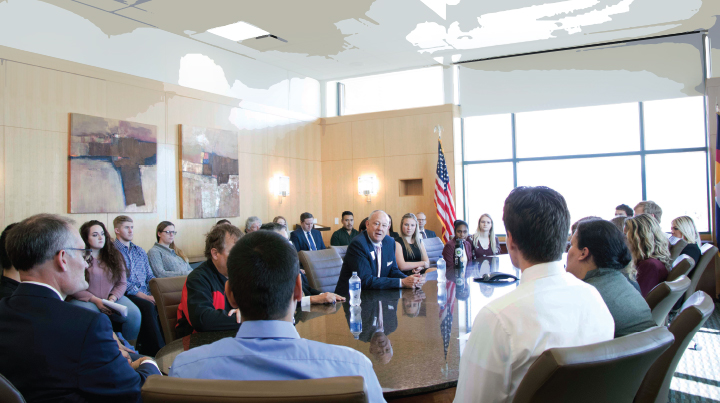
- Constitution Day guest speaker Ruben Navarrette, a nationally-syndicated conservative columnist, provoked both right- and left-leaning attendees with his thoughts on thorny issues like the Deferred Action for Childhood Arrivals and the right to form militias. He emphasized that his goal as a national commentator is to get people to think; not to tell them what to believe or how to vote.
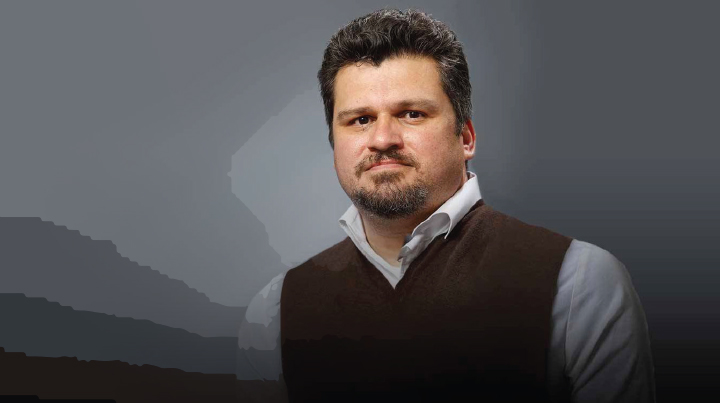
- The annual Capital Conference gave seven students from CMU and five from other Colorado universities the opportunity to join 88 state business leaders for two days of meeting with national political leaders in Washington, D.C. They were able to interact with their representatives in Washington and to hear speakers from both sides of the political spectrum.
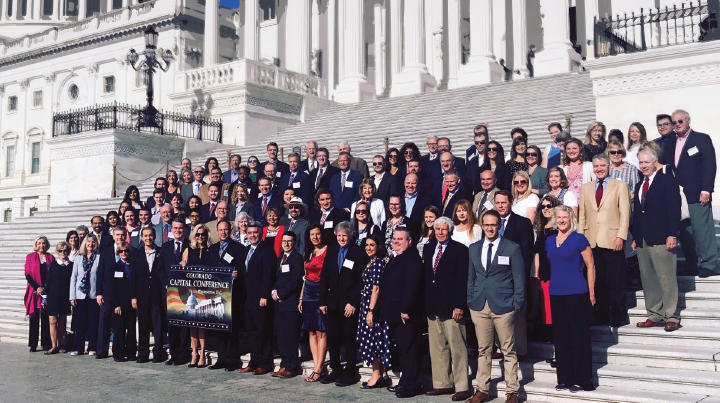
- The 2018-19 theatre season is devoted to the theme “Ends and Means: the Pursuit of Happiness.” All the plays in the lineup were chosen to spark public discussion. The presentations included 1776, a play about the founding fathers, cast entirely with women; the play Clybourne Park explores different views of race-related history; the classic Macbeth that focuses on an obsession with power; and Reefer Madness, a play based on a 1930s antimarijuana propaganda film.
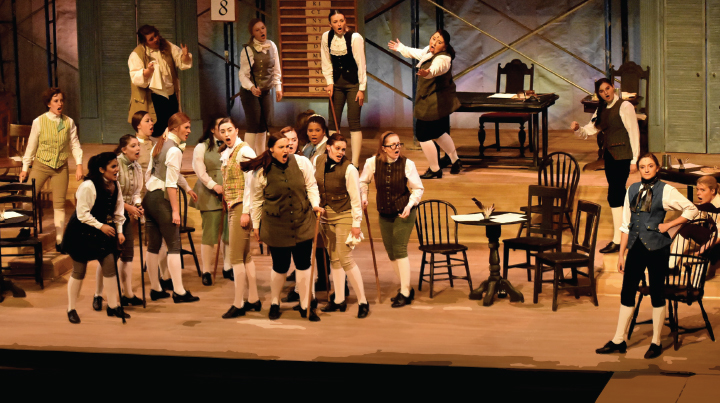
- The Michrina Lecture Series hosted Esther Belin, a leading national voice for Native American policy and art. Belin shared her knowledge of the Indian Relocation Act of 1952 that was designed to encourage Native Americans to leave reservations and assimilate into the general population. The lecture series carries out a commitment from late professor Barry Michrina to explore cultural issues.
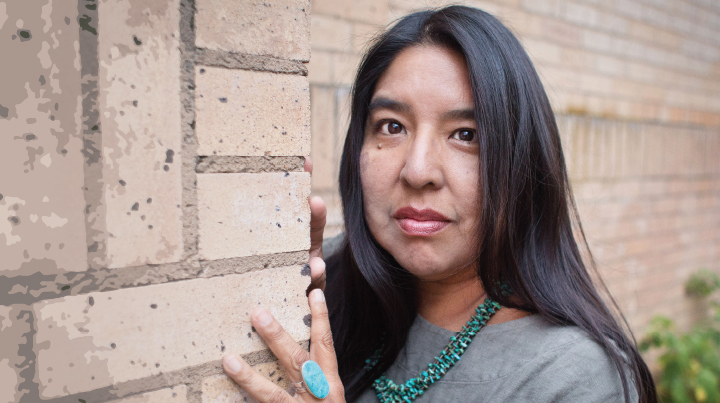
Wagner said he hoped last fall’s schedule heralds a strong and permanent campus focus on social issues.
“These kinds of things have happened on campus for a long time, but this fall many things came together,” he said. “Given the tremendous outpouring of support we’ve received from the community and those who have participated in our events, I’m excited to bring more engaging activities to campus through this new initiative.”
Foster is behind that effort and said he also pushes for civil discourse to be a part of classes.
“Civility is critical. It has never been more critical for CMU to continue to promote that concept,” he said.
Besides the marquee events at CMU, there were many smaller efforts to promote civic engagement. Students carried out a voter drive after being trained to register voters by the League of Women Voters. Long lines at a polling place located in the student center indicated that had an effect on campus. Political science students participated in polling as a lesson in how to parse political views. Numerous organized debates took place in classes.
Students whose status falls under Deferred Action for Childhood Arrivals spoke to classes about the challenges they face. Nationally-known artist Matthew Hopson-Walker exhibited his “Poverty is the Muscle of War” show at the downtown CMU art gallery. CMU Opera presented music inspired by the Holocaust.
Foster directly did his part in this effort by including a lesson on civil discourse in a Freshman Year Initiative class he taught prior to the fall semester. He posed questions to incoming students that were intended to be controversial. He emphasized listening and then making your point.
Associate Professor of Political Science Justin Gollob said he promotes understanding of civic processes every day in his classrooms.
From the 100-level classes where students learn the basics of government to upper-level classes where they get directly involved in political processes, he said he strives to make politics relevant. He does that by having students carry out exercises like balancing the state budget. They attend city council meetings and learn how to write non-leading questions for political polls.
“We need to keep civil discourse front and center, and model it on campus,” Gollob said. “We’re on the right trajectory to do that and we need to keep on that path. An important part of civil discourse is never to be content — to keep at it and continue to stay focused on what it brings to the campus and to the community.”
Former Grand Junction Daily Sentinel Editorial Page Editor and current Criterion Advisor Bob Silbernagel shares that belief. Silbernagel recently coordinated with CMU leaders on the CMU civic proposal to create the form on campus. The effort will be a first in Colorado. Silbernagel modeled the idea on civility centers promoted by the National Institute for Civil Discourse, an organization started to honor former Arizona congresswoman Gabrielle Giffords. The organization promotes building civil discourse into the fabric of every college and university.
Silbernagel said his passion to help was born out of frustration with the current political climate. His decades of reading letters to the editor at the Sentinel showed him that the political divide was deteriorating. That has only grown worse in recent years.
“It just seemed to me that a broad awareness of the history and importance of civics and civility are slipping away,” he said. “I felt like I couldn’t keep watching this and being upset about it and not try to do something.”
Silbernagel would like to see a regular roster of speakers on campus, as well as educational sessions that would delve into issues such as how the tone of political ads affects outcomes as well as session about the history of civics and where ideals of civility came from.
His proposed mission statement for a civic forum states: “Advancing the cause of civility by sharing ideas, challenging beliefs and practicing civic engagement.” Silbernagel has an end goal in mind. “I want people to realize you can have different opinions and you can still respect each other.”
Head of the CMU Department of Theatre Arts Mo LaMee offers an example of how a variety of opinions about social issues has already been woven into an unexpected venue — theatre performances. LaMee said the theatre is a powerful place for tackling tough questions because responses to plays are emotional as well as intellectual — often in entirely different ways to different viewers.
“In the theatre we are always engaged in the larger picture. Drama is about two conflicting ideas,” he said.
Ta’lor Jackson said she is heartened by all these efforts to promote CMU as a marketplace of ideas. It will serve her well when she graduates next winter to follow a path that she hopes will include law school. She has also applied for an internship in a program called College to Congress. She would be assigned to do internship work for one party and would have a mentor in the other party.
She sees that as a good opportunity to further hone her listening skills and learn more about “why things are the way they are.”
“Politics affects every area of our life. So, I want to try to figure out how it works,” she said. “I have a good start at that at CMU. I think the environment here promotes civil discourse. I think people are starting to listen.”
Ruben Navarrette, a nationally-syndicated conservative columnist, spoke at CMU on Constitution Day. He is one of many civically-engaged guest speakers who have recently spoke on campus.
